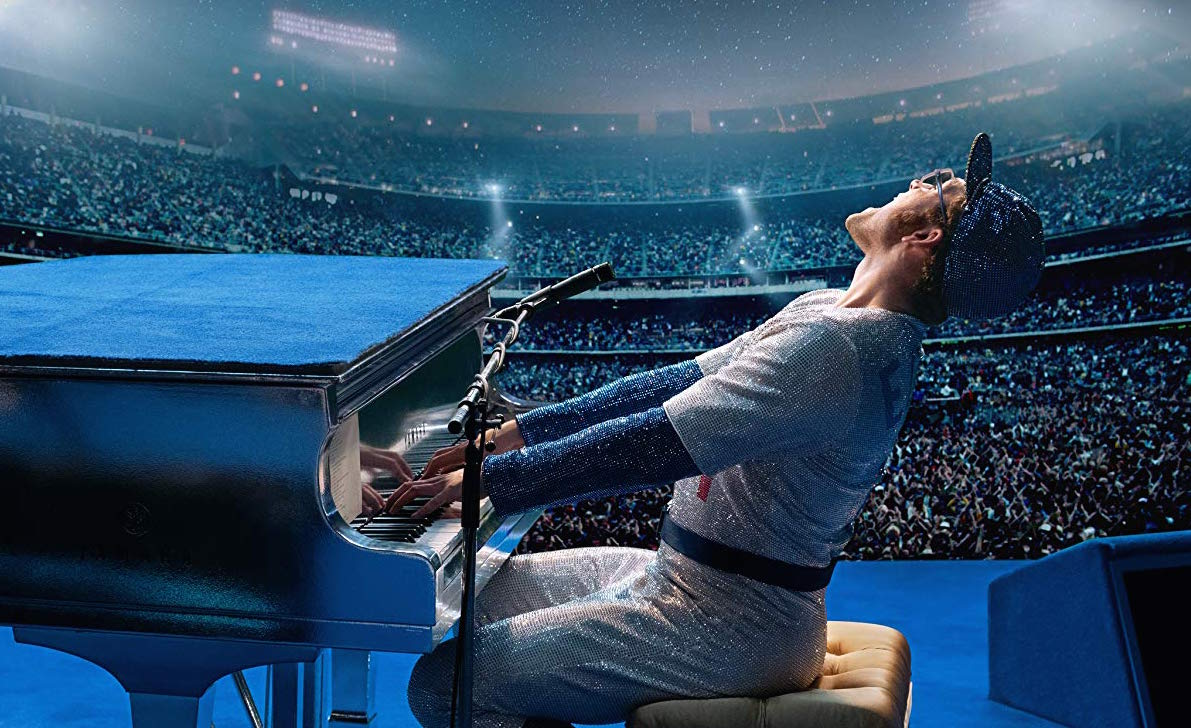Soundtracking: Rocketman
 Wednesday, June 12, 2019 at 10:07AM
Wednesday, June 12, 2019 at 10:07AM by Chris Feil
Rocketman is just about the jukeboxiest musical that ever jukeboxed, arriving on the screen with a structure more indebted to that of the stage than the kind of musical biopic (namely Bohemian Rhapsody) some might have expected. It’s as if Elton John’s and his Billy Elliot collaborator Lee Hall had shifted gears mid-conception, opting for a film with what had originally been planned for the stage. Safe bets will be on Rocketman coming to Broadway eventually anyway.

Though Elton John’s flamboyance demands the kind of showy extravagance of a splashy musical, the film doesn’t shy from the faux-grit of the biopic genre either. But what sets it apart from another jukebox musicals is that it defies chronology and the artist’s stylistic arc in favor of presenting an emotionally true one. It’s not always a perfect translation; the numbers for pre-fame Elton are forced into formula, awkwardly if unpretentiously using “I Want Love” and “Saturday Night’s Alright (For Fighting)” to satisfy the traditional peaks and valleys of the musical format.
But when the film’s measuring of the Elton John/Bernie Taupin songbook delivers something unexpected, it also comes with insight into John’s addicted psyche. “Tiny Dancer”, already iconically turned into an anthem of togetherness on screen in Almost Famous, instead positions Elton alone in the crowd. The willful isolation of “Goodbye Yellow Brick Road” comes at the dissolution of Elton and Bernie’s relationship, initiating a rock bottom that hurtles Elton to healing. “Don’t Let the Sun Go Down on Me” represents perhaps his most desperate act for stability. Seldom do jukebox musicals do this as well as Rocketman, and it’s partly because the film embraces anachronism.
Thankfully the film is also unafraid to stray from the original sound, reorchestrating the songs to be sometimes more downbeat and incorporate multiple characters. However the most personal reimagining is in the vocals of Taron Egerton, delivering a sound that reaches for the inflection of the rock star but still his own earthly, emotional sound. Musical biopics are too quick to claim loyalty to the original when serving the music of their icon, limiting our ability to connect to the performer in doing so. Egerton is lovely and arrested, pulling us into both the sway of Elton’s melody and the emotion that birthed it. For all of the production value and intense orchestration of some of Elton John’s most beloved songs, there was always a human core. For Rocketman, Egerton is that.
The film reaches its most personal and stylistically harmonious at its title track, morphing seamlessly between the interiority of his suicidal psychosis and the veneer of the stage. Here the isolation and otherworldly persona described in the song make for a fitting metaphor to the singer trapped by his reality. Like his stage persona, this sequence is fantastical and florid, playing ironically to the pain it is depicting. Even if the rest of Rocketman can't match this sequence, it captures that duality of performer better than most musical biopics do in whole movies, reinforcing the myth and the man in one soaring, heartbreaking number.
All Soundtracking installments can be found here!



Reader Comments (2)
My dear Rocket man - Taron Egerton. Keep it going my boy.
The ‘Saturday Night’ sequence was the only bit that jolted me awake. Midway through, I kept waiting for something lively, Island Girl or Philadelphia Freedom, to give me a nudge awake. Cinematically, my brain already has a better attachment to Tiny Dancer & Pinball Wizard (Almost Famous/Tommy). This film didn’t topple those attachments. (They really should’ve substituted Island Girl for Tiny Dancer in the film’s LA party scene). While the credits were rolling-ugh, it’s the Taran karaoke version of Don’t Go Breaking my Heart with a lady who looks and sounds nothing like Kiki Dee.